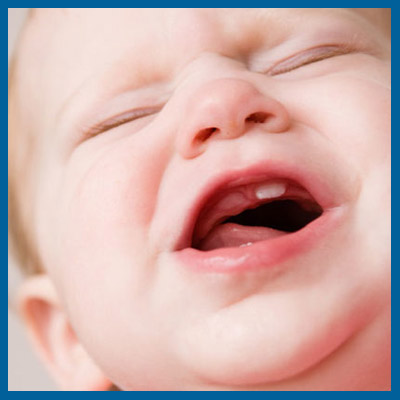Teething is when baby’s teeth start to come through their gum line. Another word for it is odontiasis.
Most babies begin to teethe between 4 and 7 months old, but some start much later. There’s no need to worry if your baby’s teeth come in on another timetable -- it can be different for every baby.
SIGNS AND SYMPTOMS OF TEETHING TROUBLES
The symptoms aren’t the same for every baby, but they may include:
- Swollen, tender gums
- Fussiness and crying
- A slightly raised temperature (less than 101 F)
- Gnawing or wanting to chew on hard things
- Lots of drool, which can cause a rash on their face
- Coughing
- Rubbing their cheek or pulling their ear
- Bringing their hands to their mouth
- Changes in eating or sleeping patterns
Teething can be painful, but it doesn’t usually make babies sick. Call doctor if baby has diarrhea, vomiting, rashes on the body, a higher fever, or cough and congestion. These aren’t normal signs of teething.
When and how teeth come in can be different for every baby and may be based on family history. But most of the time, the lower front two teeth come in first, followed by the opposite top two teeth and the two on either side of those. Next come the two on either side of the bottom front teeth, then the first molars appear. The teeth in front of the first molars are next, and the back molars are the last ones to come in.
In all, 20 “baby teeth” will eventually be in place, usually by age 3.
HOMOEOPATHIC TREATMENT FOR TEETHING TROUBLES
Aconitum apellus : If teething is very painful, and the baby seems agitated or fearful, this remedy can often bring relief. The baby's face may be flushed, the gums may look inflamed, and sleep can be very restless.
Belladonna : Intense inflammation and gum pain, with flushing of the face and a feeling of heat, often indicate a need for this remedy. The baby is restless, easily startled, and may tend to cry out during sleep.
Calcarea carbonica : If teething is late to begin, then slow and difficult, this remedy can be helpful. The baby may seem sad or anxious with the pain, making chewing motions and pressing his gums together, often even while sleeping. Babies who need this remedy are usually chubby, slow to learn to crawl or walk, and their heads often sweat during naps or sleep at night.
Calcarea phosphorica : This remedy may be helpful to a child whose teeth are late to come in, with aching in the gums and trouble sleeping. Irritability, picky eating habits, and stomachaches are other indications. A child who needs this remedy often is allergic to many foods and may tend toward early tooth decay.
Chamomilla : This remedy is often indicated when a child seems extremely irritable or angry and the pain appears to be unbearable. Babies may feel agitated, scream and hit, and want to be rocked or carried constantly to distract them from the pain. The gums may be so tender that touching them is intolerable — or they may feel better from hard pressure and biting down on something cold. Greenish diarrhea that occurs because of teething stress is another indication for Chamomilla.
Coffea cruda : This remedy can be helpful when a child seems excitable and has trouble sleeping because of teething pain. Distressing pain in the gums often is relieved by holding something cold on them.
Ignatia : If a child seems very emotional, upset, or sad because of teething, this remedy may bring relief. The baby's sleep may be light and restless, with jerking or twitching in the arms and legs.
Kreosotum : This remedy may be helpful if the child has irritating saliva and severe discomfort during teething. Teeth that decay soon after coming in often indicate a need for Kreosotum.
Magnesia phosphorica : This remedy is often helpful for painful teething, relieved by pressing on the painful area and by heat. The baby may seem happier when drinking something warm from a cup or bottle, or when biting down on an object. A warm washcloth or hot water bottle held against the cheek may also help relieve the pain.
Phytolacca : This remedy may be indicated if a baby with teething pain constantly presses his or her gums together very hard, or tries to bite down on anything in reach.
Pulsatilla : A baby who is very tearful during teething and wants to be constantly held and comforted may respond to this remedy. Biting on something cold may help and warmth increases discomfort. Cool food and drinks or being out in open air also bring improvement.
Silicea (also called Silica) : Slow, difficult teething that makes the baby tired and nervous may be helped by this remedy. Children who need Silica often have fine hair and seem a little delicate, with low resistance to colds or other illnesses.
Sulphur : This remedy may be indicated if a reddish irritation or rash develops on the baby's chin or diaper area during teething episodes. Diarrhea (often whitish) may occur because of stress. The baby is irritable and anxious, feeling worse from being warm.
TEETHING TAB







